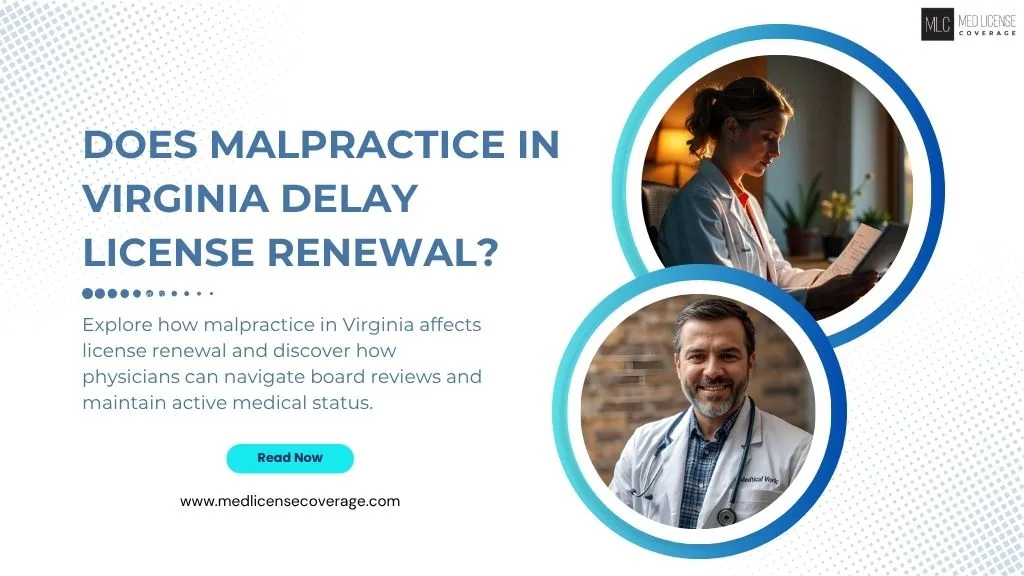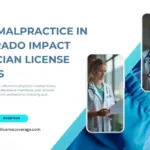1. Introduction to Malpractice in Virginia
Malpractice in Virginia plays a crucial role in physician licensing decisions. The Virginia Board of Medicine reviews each case for legal merit and risk. Licensing actions reflect both state law and patient safety standards. Even a single malpractice event can influence the outcome of a license renewal.
2. Disclosure Requirements During Renewal
Physicians must disclose malpractice in Virginia during the renewal process. All settlements, claims, and legal proceedings require reporting. Full transparency ensures that the board can properly evaluate applications. Omission or delay in disclosure may cause suspension, investigation, or complete denial of the Virginia medical license renewal.
3. Board Documentation Expectations
Renewal applications involving malpractice require comprehensive documentation. These include legal records, board investigations, and corrective action history. The board expects clarity and accuracy. Incomplete or vague responses often lead to delays. Proper organization and early submission improve approval chances during the renewal cycle.
4. Complications in Renewal Process
Malpractice complicates the path to license renewal. Even resolved cases draw additional board scrutiny. Review timelines are extended due to legal consultations and document verification. The process slows further when disciplinary hearings or medical assessments are needed to complete the evaluation.
5. National Malpractice Tracking Systems
Virginia participates in national reporting systems. Malpractice by the state is monitored through platforms like NPDB. Past malpractice in Virginia remains visible to all state boards. Cross-referencing ensures no physician bypasses scrutiny by switching jurisdictions. These systems contribute to broader transparency in healthcare licensing.
6. Impact of Multiple Malpractice Cases
A history of repeated malpractice incidents raises concern. The board evaluates patterns and severity. Multiple cases imply risk to public safety. This often leads to license renewal conditions, delays, or outright denials. The review process becomes more intensive and longer in duration.

7. Individual Case Evaluations
Each malpractice case is judged individually. Medical boards consider expert testimony, patient records, and context. The goal is to determine whether the standard of care was violated. One case may result in minor board action, while another may lead to extended restrictions or denial.
8. Corrective Action as a Mitigation Tool
Corrective actions demonstrate accountability. These include additional training, supervision, or continuing medical education. Completion of such measures often helps restore board confidence. Many physicians complete these steps before applying for a Virginia medical license renewal to improve their chances.
9. Public Safety as Licensing Priority
Patient protection remains the core mission of licensing authorities. Malpractice in Virginia is evaluated not just by legal outcome but by its implications for safety. If renewal poses a risk to the public, the board may take preventive steps, including temporary license holds or restricted renewal status.
10. Effect on Credentialing and Privileges
Hospitals and insurance networks monitor board decisions. Malpractice in Virginia can lead to suspension of medical institution privileges or delays in payer credentialing. These consequences persist even after license renewal, affecting earnings and job placement across the healthcare sector.
11. Insurance Implications Post-Malpractice
Malpractice insurance becomes harder to secure. Premiums increase after claims. In Virginia, lack of insurance coverage may delay license renewal, especially for high-risk specialties. Some insurers may also request documentation from the board, slowing the renewal process further.
12. Virginia vs. Other States’ Policies
Malpractice under state guidelines varies. Virginia maintains structured policies focused on patient protection and documentation. Compared to lenient states, Virginia requires more detailed disclosures. The benefit is increased trust in board decisions and consistent handling of malpractice-related renewal requests.
13. Pending Decisions and Temporary Status
Renewals sometimes enter pending status due to open investigations. Malpractice in Virginia under review may delay final decisions. Temporary licensure may be granted, but often with practice limitations. Final decisions follow board meetings and can take several weeks.
14. Public Records and Reputation Impact
Disciplinary actions and malpractice reports are public in Virginia. Patients and institutions regularly review these records. Delays in license renewal may affect patient trust and job opportunities. Transparency improves accountability but also increases pressure on renewal applicants with malpractice history.
15. Conditional License Renewals
In certain situations, the board issues conditional renewals. These allow limited practice under board-defined terms. Conditions may include regular reports, restricted procedures, or mentorship. This serves as a middle ground while awaiting the full outcome of a malpractice review.
16. Disciplinary Hearing Options
Some cases require hearings. Physicians present evidence, expert testimony, and action plans. Boards value proactive behavior and professional insight. A strong defense may lead to renewal approval, despite a malpractice history. The process is formal and may involve legal counsel.
17. Support from Legal or Licensing Experts
Specialists in physician licensing services play a crucial role. Legal professionals understand state board procedures and document needs. Their steering allows them to keep away from utility errors, improve reaction methods, and frequently shorten delays as a result of malpractice inquiries.
18. Importance of Documentation Quality
Well-organized documentation strengthens the renewal application. The board expects precise legal summaries, medical evaluations, and past correspondence. Missing or vague entries slow down processing. High-quality submissions reduce follow-up requests and expedite the review cycle.
19. License Reinstatement Opportunities
If renewal is denied due to malpractice, reinstatement remains possible. The board allows reapplication after deficiencies are corrected. A clean professional record following board action and documented growth supports approval for reinstatement.
20. Not All Malpractice Results in Denial
One malpractice event does not equal license loss. Many physicians maintain active practice after board reviews. When handled correctly, a Virginia medical license renewal can still succeed. Early preparation, compliance, and corrective actions build trust with licensing authorities.
21. Timeframe and Risk Evaluation
The board reviews malpractice based on time and risk. Older cases with resolved actions carry less weight. Ongoing or recent malpractice in Virginia triggers more scrutiny. Timing and context influence final board decisions during renewal.
22. Specialty-Based Review Intensification
High-risk specialties face stricter evaluation. Surgeons, anesthesiologists, and ER professionals undergo deeper review after malpractice. This practice ensures that critical-care roles meet state safety expectations. Renewal delays are common for these fields if malpractice is recent.
23. Policy Updates and Awareness
Virginia updates its policies regularly. Physicians must stay informed. Current forms, disclosure formats, and board rules evolve with legislation. Following outdated procedures leads to rejection. Staying current prevents avoidable delays in license renewal.
Conclusion
Malpractice in Virginia can delay license renewal, but outcomes depend on response, transparency, and readiness. With complete documentation, corrective action, and board compliance, renewal is still possible. Consistent communication and support from experienced professionals improve success rates and promote continued medical practice.







